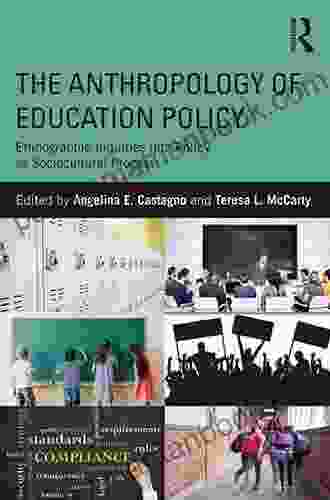The Anthropology of Education Policy: Exploring the Cultural and Social Dimensions of Educational Decision-Making

Education policy is a complex and multifaceted field that is shaped by a variety of factors, including cultural, social, economic, and political forces. In recent years, there has been growing interest in the anthropology of education policy, which seeks to understand how these forces interact to influence the development and implementation of education policy.
Anthropologists of education policy study a wide range of topics, including:
5 out of 5
| Language | : | English |
| File size | : | 661 KB |
| Text-to-Speech | : | Enabled |
| Enhanced typesetting | : | Enabled |
| Word Wise | : | Enabled |
| Print length | : | 272 pages |
| Screen Reader | : | Supported |
- The role of culture in shaping educational policy
- The social and political factors that influence educational decision-making
- The impact of education policy on students, teachers, and communities
- The ways in which education policy is contested and negotiated
By studying these topics, anthropologists of education policy seek to gain a deeper understanding of the complex relationship between education and society. This understanding can be used to inform the development and implementation of education policy that is more equitable and effective.
The Role of Culture in Shaping Educational Policy
Culture plays a significant role in shaping educational policy. The values, beliefs, and norms of a society influence the way that people think about education and the role that it should play in society. For example, in some cultures, education is seen as a way to prepare young people for the workforce, while in other cultures, it is seen as a way to develop the whole person.
The cultural context in which an education policy is developed and implemented can have a significant impact on its success or failure. For example, a policy that is designed to promote academic achievement may not be effective in a culture that values other forms of learning, such as creativity or social responsibility.
Anthropologists of education policy can help to identify the cultural factors that are likely to influence the success or failure of an education policy. This information can be used to develop policies that are more culturally sensitive and effective.
The Social and Political Factors that Influence Educational Decision-Making
Education policy is also shaped by a variety of social and political factors. These factors include the power relations between different groups in society, the distribution of resources, and the political ideology of the government.
The social and political context in which an education policy is developed and implemented can have a significant impact on its success or failure. For example, a policy that is designed to promote equity may not be effective if it is implemented in a society that is highly stratified. Similarly, a policy that is designed to promote innovation may not be effective if it is implemented in a government that is highly centralized.
Anthropologists of education policy can help to identify the social and political factors that are likely to influence the success or failure of an education policy. This information can be used to develop policies that are more socially and politically sensitive and effective.
The Impact of Education Policy on Students, Teachers, and Communities
Education policy has a significant impact on students, teachers, and communities. The way that education policy is developed and implemented can affect the quality of education that students receive, the working conditions of teachers, and the overall well-being of communities.
For example, a policy that is designed to promote accountability may lead to increased stress and anxiety for students and teachers. Similarly, a policy that is designed to promote school choice may lead to increased segregation and inequality.
Anthropologists of education policy can help to identify the potential impacts of an education policy on students, teachers, and communities. This information can be used to develop policies that are more equitable and effective.
The Ways in Which Education Policy is Contested and Negotiated
Education policy is not a static entity. It is constantly being contested and negotiated by different groups in society. These groups include students, teachers, parents, administrators, and politicians.
The way that education policy is contested and negotiated can have a significant impact on its success or failure. For example, a policy that is developed without the input of stakeholders is less likely to be successful than a policy that is developed through a participatory process.
Anthropologists of education policy can help to identify the different groups that are involved in the contestation and negotiation of education policy. This information can be used to develop policies that are more inclusive and democratic.
The anthropology of education policy is a growing field that is providing new insights into the complex relationship between education and society. By studying the cultural, social, political, and economic factors that influence educational decision-making, anthropologists of education policy are helping to develop more equitable and effective education policies.
5 out of 5
| Language | : | English |
| File size | : | 661 KB |
| Text-to-Speech | : | Enabled |
| Enhanced typesetting | : | Enabled |
| Word Wise | : | Enabled |
| Print length | : | 272 pages |
| Screen Reader | : | Supported |
Do you want to contribute by writing guest posts on this blog?
Please contact us and send us a resume of previous articles that you have written.
 Top Book
Top Book Novel
Novel Fiction
Fiction Nonfiction
Nonfiction Literature
Literature Paperback
Paperback Hardcover
Hardcover E-book
E-book Audiobook
Audiobook Bestseller
Bestseller Classic
Classic Mystery
Mystery Thriller
Thriller Romance
Romance Fantasy
Fantasy Science Fiction
Science Fiction Biography
Biography Memoir
Memoir Autobiography
Autobiography Poetry
Poetry Drama
Drama Historical Fiction
Historical Fiction Self-help
Self-help Young Adult
Young Adult Childrens Books
Childrens Books Graphic Novel
Graphic Novel Anthology
Anthology Series
Series Encyclopedia
Encyclopedia Reference
Reference Guidebook
Guidebook Textbook
Textbook Workbook
Workbook Journal
Journal Diary
Diary Manuscript
Manuscript Folio
Folio Pulp Fiction
Pulp Fiction Short Stories
Short Stories Fairy Tales
Fairy Tales Fables
Fables Mythology
Mythology Philosophy
Philosophy Religion
Religion Spirituality
Spirituality Essays
Essays Critique
Critique Commentary
Commentary Glossary
Glossary Bibliography
Bibliography Index
Index Table of Contents
Table of Contents Preface
Preface Introduction
Introduction Foreword
Foreword Afterword
Afterword Appendices
Appendices Annotations
Annotations Footnotes
Footnotes Epilogue
Epilogue Prologue
Prologue Gillian Flynn
Gillian Flynn Solmaz Sharif
Solmaz Sharif Ken Hyland
Ken Hyland Mary Jane Maguire Fong
Mary Jane Maguire Fong Clarissa Gosling
Clarissa Gosling Peter Flannery
Peter Flannery John Elray
John Elray Graham Ison
Graham Ison William Strauss
William Strauss Shannon Merenstein
Shannon Merenstein Randall L B Mcneill
Randall L B Mcneill April Falcon Doss
April Falcon Doss Mary Karr
Mary Karr Geri Lobiondo Wood
Geri Lobiondo Wood David Mccullough Jr
David Mccullough Jr Morgan Nikola Wren
Morgan Nikola Wren Rita Duponty
Rita Duponty Stephen Rollnick
Stephen Rollnick Felice Vinci
Felice Vinci Taylor R Cruse
Taylor R Cruse
Light bulbAdvertise smarter! Our strategic ad space ensures maximum exposure. Reserve your spot today!

 Elias MitchellThe Legion of Super-Heroes: A Comprehensive Look at the Epic 1980-1989 Saga
Elias MitchellThe Legion of Super-Heroes: A Comprehensive Look at the Epic 1980-1989 Saga John MiltonFollow ·5.8k
John MiltonFollow ·5.8k Anton FosterFollow ·5.6k
Anton FosterFollow ·5.6k Mark TwainFollow ·7.1k
Mark TwainFollow ·7.1k José SaramagoFollow ·4.3k
José SaramagoFollow ·4.3k Dashawn HayesFollow ·11.1k
Dashawn HayesFollow ·11.1k Rick NelsonFollow ·6.6k
Rick NelsonFollow ·6.6k Alvin BellFollow ·11.5k
Alvin BellFollow ·11.5k Julio CortázarFollow ·6k
Julio CortázarFollow ·6k

 Patrick Hayes
Patrick HayesDeath on Stage: Euphemia Martins Mystery 16
Synopsis In the...

 Benji Powell
Benji Powell1001 Best Baking Recipes Of All Time
Baking is a fun and...

 Terry Bell
Terry BellDestined War of the Covens: A Supernatural Saga of Power,...
Welcome to the...

 Mark Twain
Mark TwainBitcoin For Mere Mortals: A Comprehensive Guide for...
Bitcoin is a...

 Dennis Hayes
Dennis HayesThe Best Budget Gaming PC 2024: Build the Ultimate Gaming...
Are you looking to build the best budget...
5 out of 5
| Language | : | English |
| File size | : | 661 KB |
| Text-to-Speech | : | Enabled |
| Enhanced typesetting | : | Enabled |
| Word Wise | : | Enabled |
| Print length | : | 272 pages |
| Screen Reader | : | Supported |












